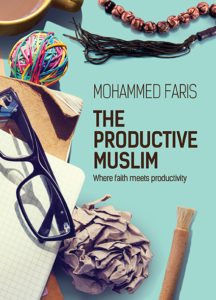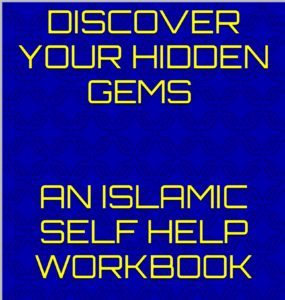Book Details:
Title: The Productive Muslim – When Faith meets Productivity
Author: Mohammed Faris
Publisher: Awakening Publications, 2016
Length: 232 Pages
Brief Biography of Author:
Mohammed Faris is the founder of ProductiveMuslim.com, an online social enterprise dedicated to boosting productivity in the Muslim world. He is an international speaker, author and coach and has delivered many public workshops in cities around the world. In 2014, Mohammed was added to the list of 500 Most Influential Muslims by the Royal Islamic Strategic Studies Center in Jordan. (Biography taken from back cover the book)
Summary of the Productive Muslim:
The title of the Productive Muslim is very clear. The book is all about being a practicing Muslim and how to increase productivity while doing so. The core of this book is divided into three main sections: Spiritual Productivity, Physical Productivity and Social Productivity.
The main theme of the book is that Islam gives us all the tools to be productive, and these include spiritual resources like Salah and Fasting. There is a lot of focus on the benefits of various acts of worship and Islamic habits.
Other topics covered in this book include the importance of setting goals, developing a vision and developing good habits. There is an extra chapter at the end focusing on productivity in Ramadan.
Review of the Productive Muslim:
I have been a fan of the Productive Muslim website for many years now, and in many ways, it has been the inspiration behind Islamic Self Help and our eBooks. As an author of Self Help eBooks, I really appreciate the effort that went into this book.
The first thing that stands out about this book is the simple language used. Every concept is explained in the easiest manner, making it accessible to any reader. The second thing that I loved about this book is the illustrative summaries at the end of each chapter that helps you revise and remember the core points.
The book is well edited, structured in a mostly-logical manner, and contains dozens of productivity boosting tips. My personal favorite section is the chapter on spiritual productivity and especially the details about the benefits of Salah. This chapter is a must-read for every believer.
There are few things about the chapter order which did not make sense to me. Goal-setting and vision planning were mentioned at the very end of the book, and very briefly. This chapter could have benefited from more details and being placed earlier in the book. Likewise, the chapter on Ramadan seems out of place and would be better suited as an Appendix.
These, however, are tiny nitpicks from a reader who enjoyed the book so much, I wanted perfection for it. At the end of the day, this is a well-written, detailed, and ‘productive’ read indeed.
Rating: Highly Recommended
Get Your Copy Here:
Review written by Shaykh Ismail Kamdar, founder of Islamic Self Help and author of several eBooks including Getting The Barakah: An Islamic Guide to Time Management and Best Of Creation: An Islamic Guide to Self Confidence.





